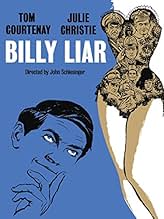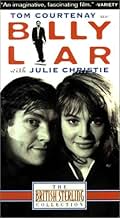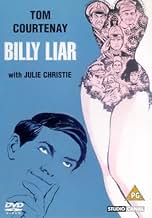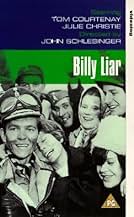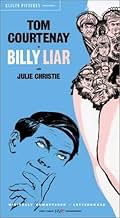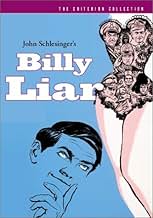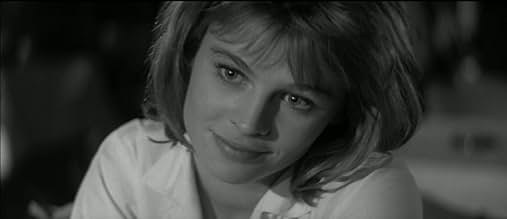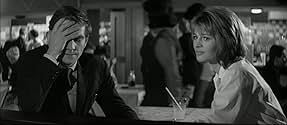IMDb RATING
7.2/10
7.4K
YOUR RATING
A lazy, irresponsible young clerk (Sir Tom Courtenay) in provincial Northern England lives in his own fantasy world and makes emotionally immature decisions as he alienates friends and famil... Read allA lazy, irresponsible young clerk (Sir Tom Courtenay) in provincial Northern England lives in his own fantasy world and makes emotionally immature decisions as he alienates friends and family.A lazy, irresponsible young clerk (Sir Tom Courtenay) in provincial Northern England lives in his own fantasy world and makes emotionally immature decisions as he alienates friends and family.
- Nominated for 6 BAFTA Awards
- 1 win & 7 nominations total
Jim Brady
- Prisoner Escort
- (uncredited)
Aleksander Browne
- Bit Part
- (uncredited)
James Byron
- Serviceman
- (uncredited)
Featured reviews
Tragi-comic misadventures of a young man who invents a fantasy world as cover for his troubles and dreary middle-class existence in sixties Yorkshire.
Billy Liar was always a terrific film, but like so many of its kitchen-sink contemporaries (Saturday Night and Sunday Morning, A Kind of Loving) it has actually grown in substance and depth since its release. Part of the reason is the extensive use of on-location filming all these movies utilised: a post-war industrial landscape long since lost and therefore all the more vivid in its posterity. But where Billy Liar gets a bigger march on its predecessors - whether by intent or accident - is that it captures this landscape on the cusp of the swinging sixties, when architecture, culture, leisure and morality were all rapidly changing. In doing so it heralds many of the themes and issues that were to dominate western culture for the remainder of the 20th Century: pop culture, advertising, media obsession, celebrity, race relations and fantasy lifestyles.
Billy seemed an endearing but essentially lost soul in his day; an immature weakling unable to face up to the realities and responsibilities of adulthood. But looked at from the hindsight of 40 years he now seems symptomatic of what is today regarded as normal, almost aspirational, behaviour: self-absorption; avoidance of responsibility; glorification of celebrity; escape culture.
Whether director John Schelsinger and writers Keith Waterhouse and Willis Hall foresaw all the cultural and sociological changes they captured is something only they would know (they surely couldn't have seen the significance of casting Julie Christie - one of the ultimate swinging sixties icons). Whatever the case, what makes Billy Liar such a fascinating film is the casual, uncritical and unselfconscious way its many themes are observed. Its lack of preachiness or self-righteousness help keep it a fresh and funny entertainment that can be enjoyed at that level. Its historical importance as a perfect snapshot of a country at a time of rapid and fundamental change is nothing less than priceless.
Billy Liar was always a terrific film, but like so many of its kitchen-sink contemporaries (Saturday Night and Sunday Morning, A Kind of Loving) it has actually grown in substance and depth since its release. Part of the reason is the extensive use of on-location filming all these movies utilised: a post-war industrial landscape long since lost and therefore all the more vivid in its posterity. But where Billy Liar gets a bigger march on its predecessors - whether by intent or accident - is that it captures this landscape on the cusp of the swinging sixties, when architecture, culture, leisure and morality were all rapidly changing. In doing so it heralds many of the themes and issues that were to dominate western culture for the remainder of the 20th Century: pop culture, advertising, media obsession, celebrity, race relations and fantasy lifestyles.
Billy seemed an endearing but essentially lost soul in his day; an immature weakling unable to face up to the realities and responsibilities of adulthood. But looked at from the hindsight of 40 years he now seems symptomatic of what is today regarded as normal, almost aspirational, behaviour: self-absorption; avoidance of responsibility; glorification of celebrity; escape culture.
Whether director John Schelsinger and writers Keith Waterhouse and Willis Hall foresaw all the cultural and sociological changes they captured is something only they would know (they surely couldn't have seen the significance of casting Julie Christie - one of the ultimate swinging sixties icons). Whatever the case, what makes Billy Liar such a fascinating film is the casual, uncritical and unselfconscious way its many themes are observed. Its lack of preachiness or self-righteousness help keep it a fresh and funny entertainment that can be enjoyed at that level. Its historical importance as a perfect snapshot of a country at a time of rapid and fundamental change is nothing less than priceless.
Having seen Albert Finney on stage I didn't feel that Tom Courtney was as strong in the lead role for the film but in many ways this suits the part. No point in making the daydreaming loser too strong in personality, although the anomaly here is that he seems to have no difficulty attracting the ladies even if he is a bit soppy. Never as funny as the book, Schlesinger opens up the film and those facial gestures from the stage and subtle asides in the book are lost. As a movie capturing the times that were very much about to change it is brilliant. I loved the opening credits with the rows of semi-detached houses (because we are talking poor middle class here, not working class) and the shots of slum clearance. The tone is apt too and very theme, so central here, of 'going down to London' so much of the time just a few years before those swing sixties would burst everything apart. One last point, should anyone be wary of bothering with a British 'kitchen sink' drama, there is an early and completely incandescent performance from Julie Christie. She glows on screen and is particularly noticeable with the surrounding drabness and the usual stereotypical British girls on show. A sensational performance that set Christie up fora very decent career and parts in some very influential and important films, not least her next with the same director - Darling.
Your trapped inside a home with aging parents (and a grandparent), in a town you'd really rather not frequent, working at the undertaker, you're the epitome of faker, although you have a little world where you're content. Now you've got yourself into a spot of bother, an engagement ring to two is what you've proffered, plus a stash of calendars, because of your malingerers, and the petty cash is short inside its coffers.
Never a dull moment in the life of Billy, as he perpetually puts himself into situations and scenarios that are all his own doing, with wonderful performances all round that still have an impact to this day.
Never a dull moment in the life of Billy, as he perpetually puts himself into situations and scenarios that are all his own doing, with wonderful performances all round that still have an impact to this day.
Effective slice of life comedy/drama tells the story of scared, optimistic Billy (Tom Courtenay) who lives in a fantasy world where he's always a hero. Funny and charming, the film also packs a slight emotional punch that is somewhat similar to The Last Picture Show. Based on a stage play, the story of Billy Liar has since been revamped as a musical yet it's this 1963 version that works best.
Tom Courtenay and Julie Christie (Liz) leapfrogged to stardom with their performances but every actor is beautifully cast: Mona Washbourne, Wilfred Pickles, and Ethel Griffies are the character types who give Billy's family heartbreaking nuances while Helen Fraser and Gwendolyn Watts bring a refreshingly sympathetic humanity to his polar opposite fiancees.
Liz's entrance, Billy's fantasies, a dance hall sequence, a quiet hospital exchange between Billy and his mother, and the final choice are classic scenes that have been constructed with genius by John Schlesinger (Darling, Midnight Cowboy, Sunday Bloody Sunday). The Criterion Collection's DVD treatment of Billy Liar is a standout and shouldn't be missed. It's a great film.
Tom Courtenay and Julie Christie (Liz) leapfrogged to stardom with their performances but every actor is beautifully cast: Mona Washbourne, Wilfred Pickles, and Ethel Griffies are the character types who give Billy's family heartbreaking nuances while Helen Fraser and Gwendolyn Watts bring a refreshingly sympathetic humanity to his polar opposite fiancees.
Liz's entrance, Billy's fantasies, a dance hall sequence, a quiet hospital exchange between Billy and his mother, and the final choice are classic scenes that have been constructed with genius by John Schlesinger (Darling, Midnight Cowboy, Sunday Bloody Sunday). The Criterion Collection's DVD treatment of Billy Liar is a standout and shouldn't be missed. It's a great film.
"Billy Liar!" impressed me more than many other admirable British pictures of this era, like "Room at the Top", "The Loneliness of the Long Distance Runner" and "This Sporting Life". It managed to generate a more tangible blend of poignancy and amusement. It's not often humour of the "laugh-out-loud" nature, more of the subtle, grim kind. The reality of Britain at that time is I suspect, very well conveyed here, with the old working-class, represented by Councillor Duxbury (astutely played by the fine Finlay Currie) and Billy's family, very much at odds with what they see as an ungrateful, decadent youth. All the performances hit the intended mark, with Leonard Rossiter typically Rossiter, almost as a younger Rigsby, without so much noticeable seediness. Julie Christie is as good as the role allows, an odd role, very much the "dream girl" of Billy and I dare say a good few others. The film expertly avoids sentimentalizing matters by its cunning, apposite last section. The Danny Boon character is, one suspects, all too typical of the TV light entertainer mould in reality. His reliance on cheap non-gags, smug guffaws and "audience banter" is well conveyed in just a few short scenes. It's interesting that Billy seems to aspire so much to write for him in particular... Helen Fraser's character Barbara is wonderfully quaint; a type long gone it seems. One can understand Billy's frustrations with his respectively prudish and plain (Barbara) and ignorant (Rita) girlfriends, and his anger at his family, although some sympathy is correctly reserved for them. The direction is very good by Schlesinger, emphasizing all the right things. The fine context-setting opening montage expertly draws in the viewer, and never at any stage henceforth is anyone's attention likely to wane. The film is most of all Tom Courtenay's; he gives a truly resonant performance, bringing to vivid life a character far removed from the norms of film making at the time. The fantasy sequences are finely done, and all add more deep impression of this character. His digressive tendencies, self-destructive habits, economy with the truth are well balanced by a sense of yearning and imagination. One cannot help but like and relate to the character, a creation that resoundingly rings true. His ambivalence to the class system comes across concisely, in particular. A fine film indeed, with so many of the smaller touches that many films miss. Witty, sad and a seminal film of the era, very much a crossroads in British history. Rating:- **** 1/2/*****
Did you know
- TriviaThis movie made a star of Julie Christie, even though she's only in it for a total of twelve minutes.
- GoofsIn the opening title sequence, where a woman places a blanket over a balcony and runs off, an arm can be seen popping up from behind the wall and throwing the blanket off the balcony.
- Quotes
Alice Fisher: If you're in any more trouble, Billy, it's not something you can leave behind you, you know. You put it in your suitcase, and you take it with you.
- ConnectionsFeatured in Film Review: Julie Christie & John Schlesinger (1967)
- SoundtracksTwisterella
Performed by Muriel Day (dubbed by unknown vocalist)
- How long is Billy Liar?Powered by Alexa
Details
- Release date
- Country of origin
- Language
- Also known as
- Lažov Bili
- Filming locations
- 37 Midland Road, Baildon, Shipley, Bradford, West Yorkshire, England, UK(Billy's house, Stradhoughton)
- Production companies
- See more company credits at IMDbPro
Box office
- Budget
- £236,809 (estimated)
- Gross worldwide
- $29,153
- Runtime1 hour 38 minutes
- Color
- Aspect ratio
- 2.35 : 1
Contribute to this page
Suggest an edit or add missing content



